Abstract
Cancer patients undergoing radiotherapy frequently report fatigue. However, knowledge of the importance of fatigue for these patients and of the factors associated with their fatigue is limited. The aim of the current investigation was to gain more insight into fatigue as related to radiotherapy by answering the following questions. First, how is the experience of fatigue best described? Secondly, to what extent is fatigue related to sociodemographic, medical (including treatment), physical and psychological factors? Finally, is it possible to predict which patients will suffer from fatigue after completion of radiotherapy? Patients with different types of cancer receiving radiotherapy with curative intent (n = 250) were interviewed before and within 2 weeks of completion of radiotherapy. During treatment, patients rated their fatigue at 2-weekly intervals. Results indicate a gradual increase in fatigue over the period of radiotherapy and a decrease after completion of treatment. Fatigue scores obtained after radiotherapy were only slightly, although significantly, higher than pretreatment scores. After treatment, 46% of the patients reported fatigue among the three symptoms that caused them most distress. Significant associations were found between post-treatment fatigue and diagnosis, physical distress, functional disability, quality of sleep, psychological distress and depression. No association was found between fatigue and treatment or personality characteristics. Multivariate regression analysis demonstrated that the intensity of pretreatment fatigue was the best predictor of fatigue after treatment. In view of this finding, a regression analysis was performed to gain more insight into the variables predicting pretreatment fatigue. The degree of functional disability and impaired quality of sleep were found to explain 38% of the variance in fatigue before starting radiotherapy. Fatigue in disease-free patients 9 months after treatment is described in paper (B) in this issue.
Full text
PDF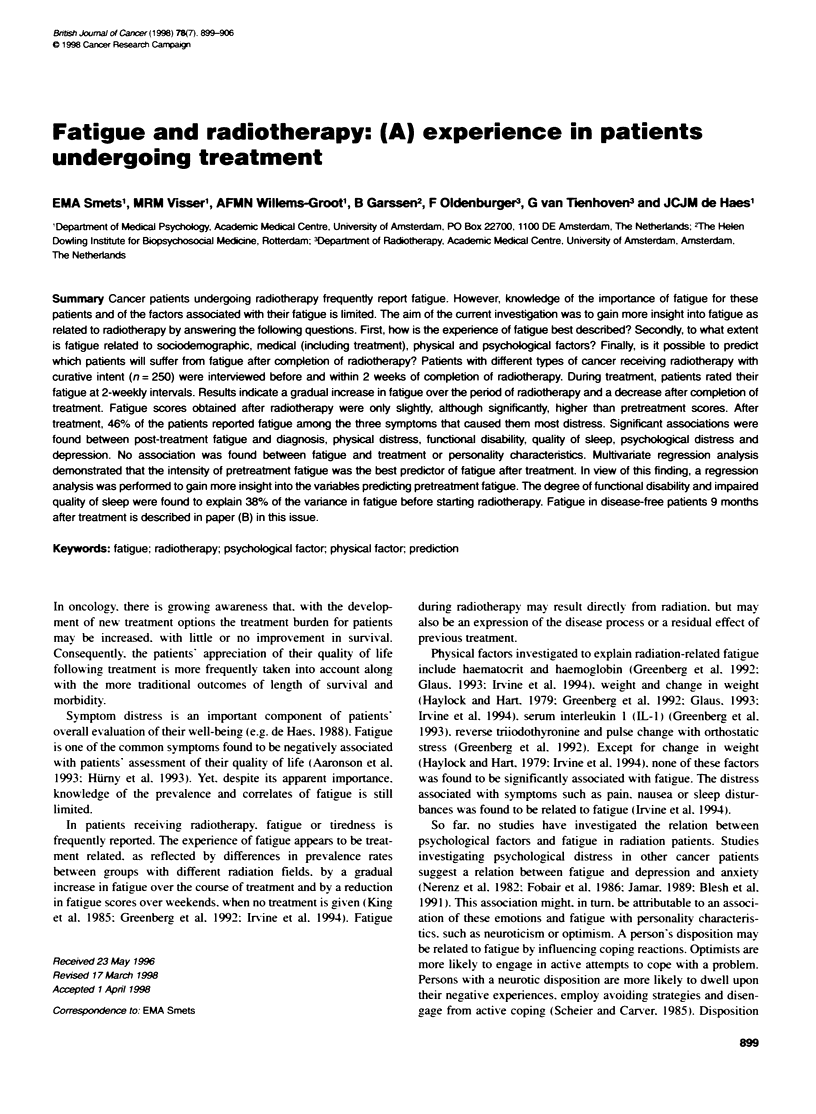
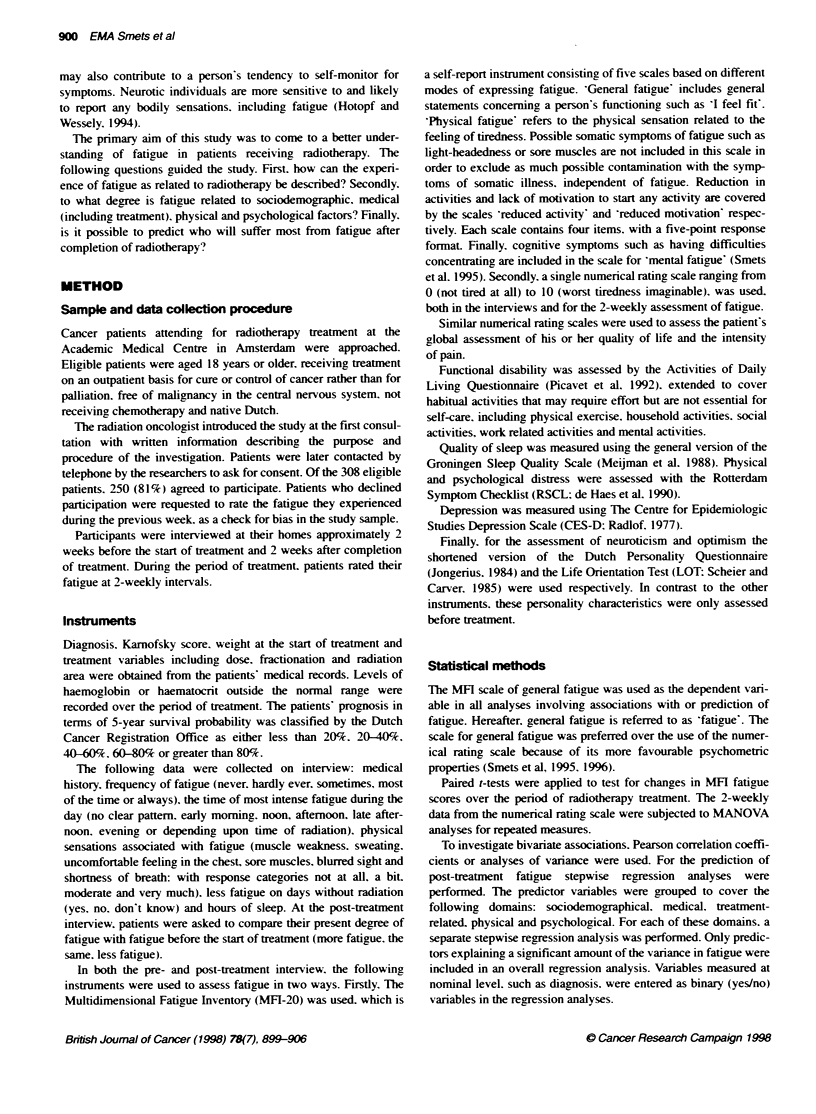
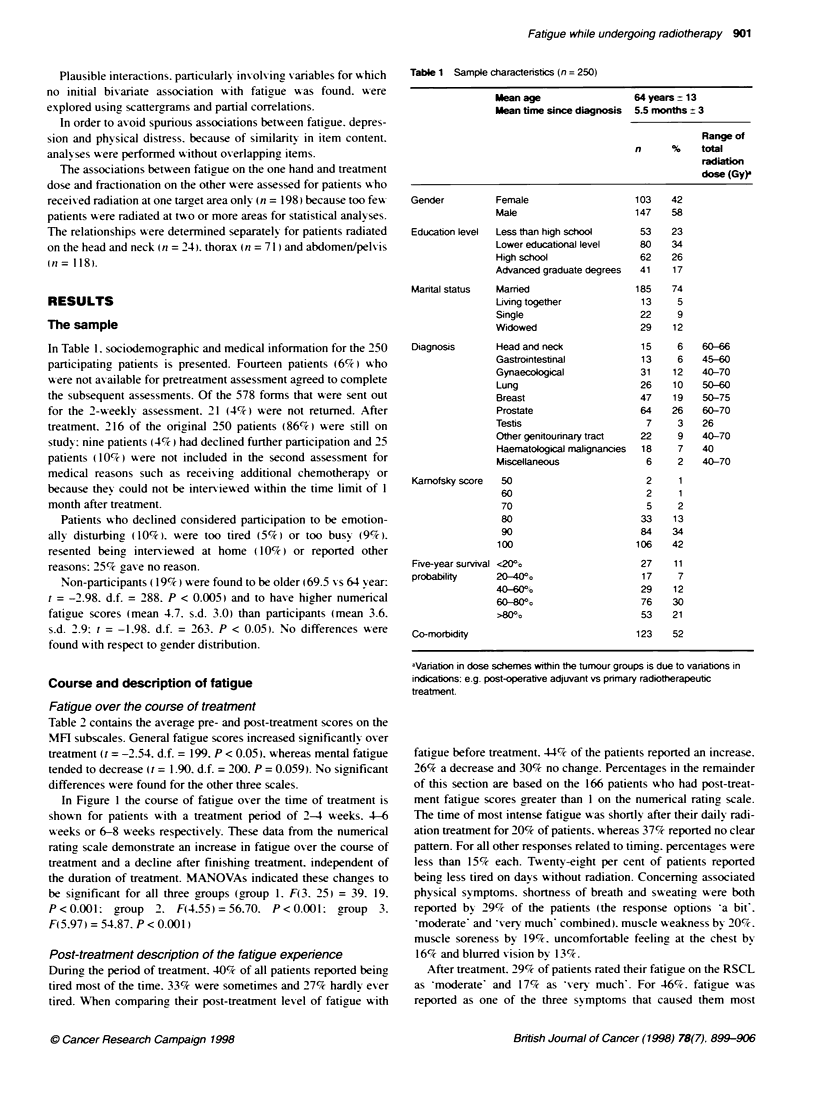
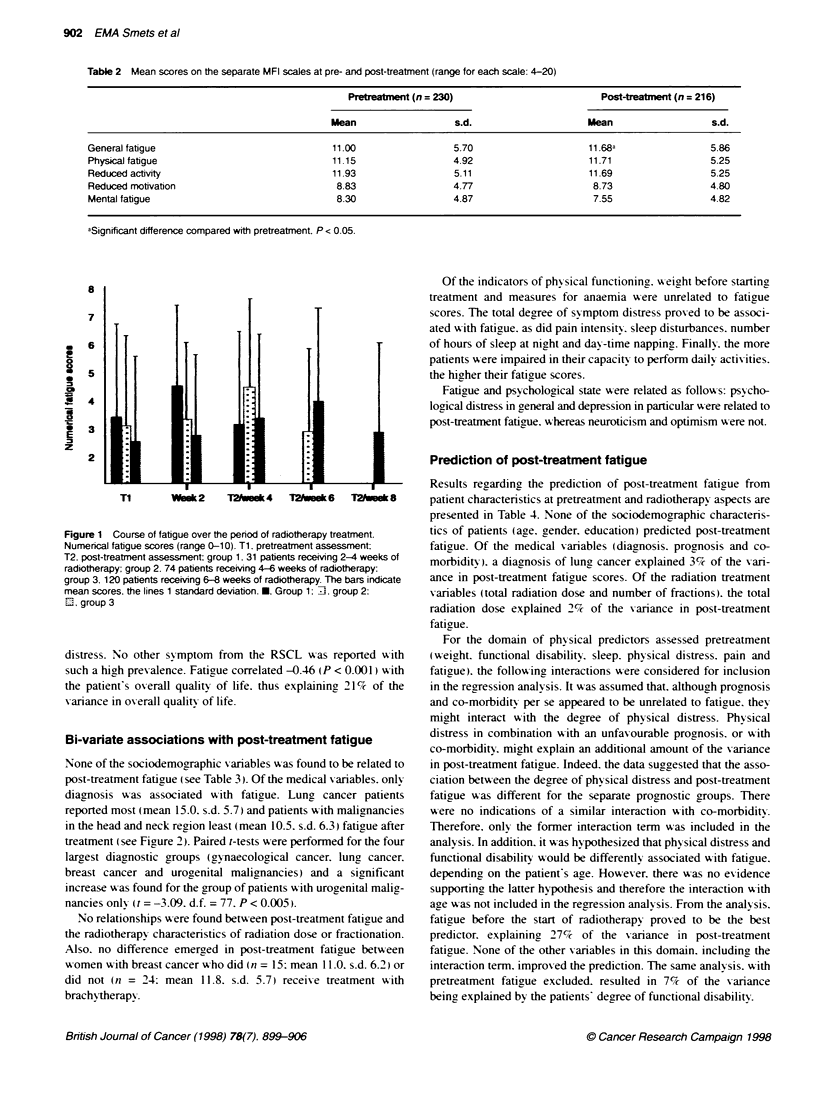
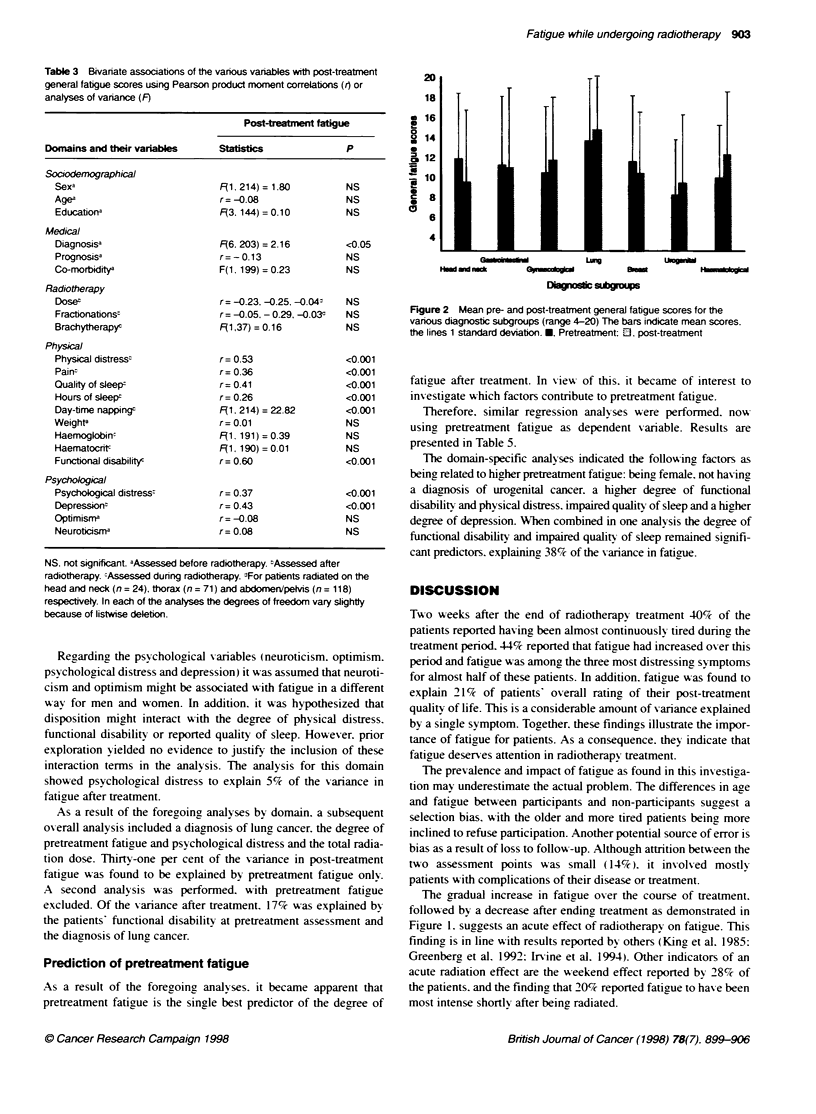
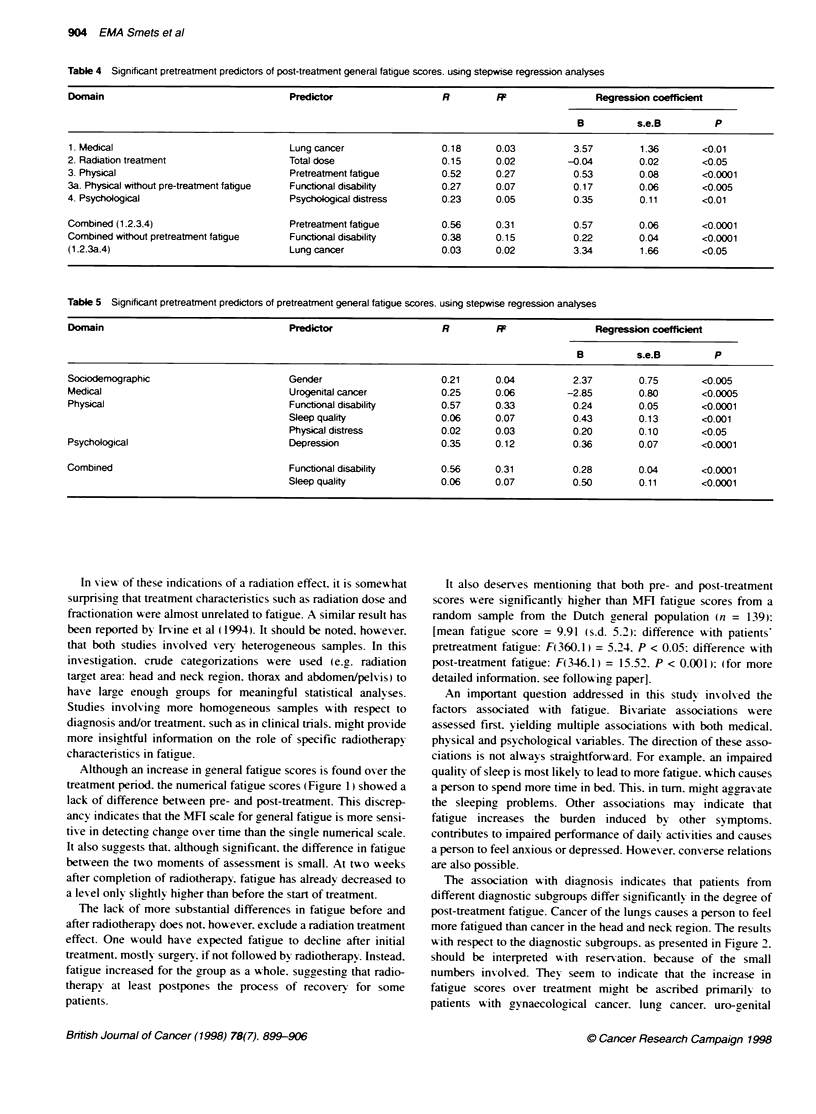
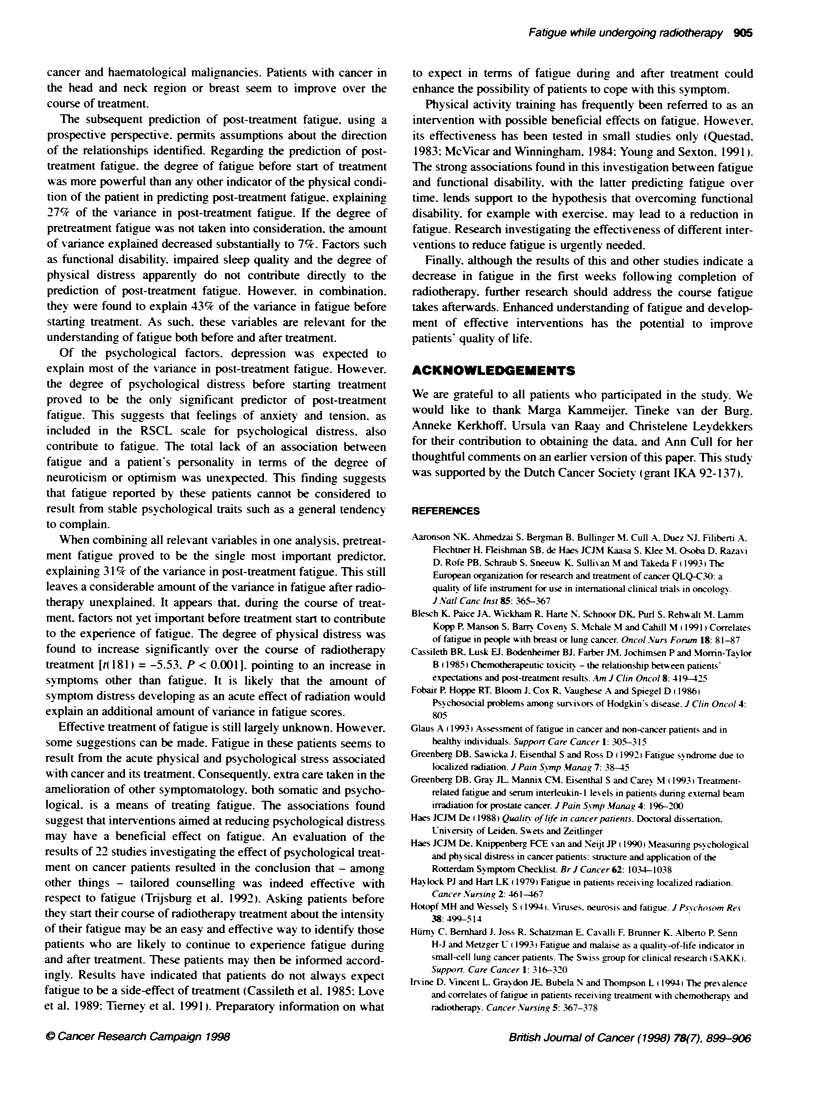
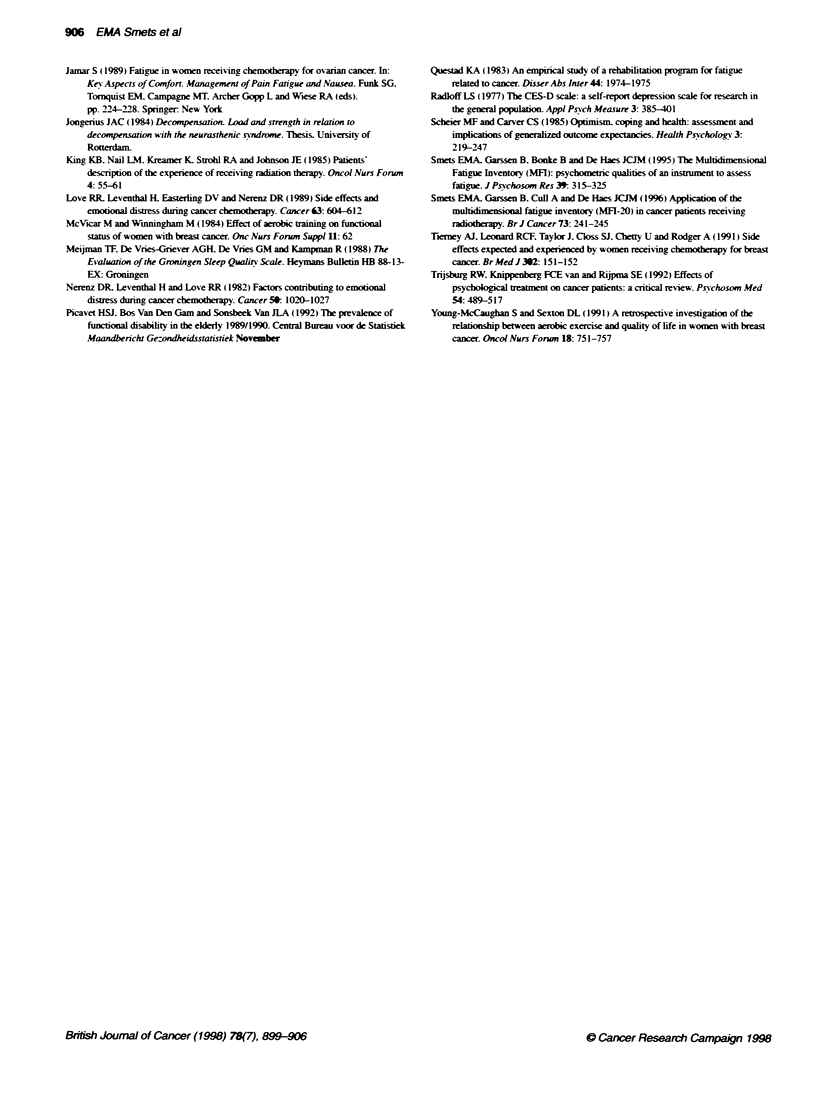
Selected References
These references are in PubMed. This may not be the complete list of references from this article.
- Aaronson N. K., Ahmedzai S., Bergman B., Bullinger M., Cull A., Duez N. J., Filiberti A., Flechtner H., Fleishman S. B., de Haes J. C. The European Organization for Research and Treatment of Cancer QLQ-C30: a quality-of-life instrument for use in international clinical trials in oncology. J Natl Cancer Inst. 1993 Mar 3;85(5):365–376. doi: 10.1093/jnci/85.5.365. [DOI] [PubMed] [Google Scholar]
- Cassileth B. R., Lusk E. J., Bodenheimer B. J., Farber J. M., Jochimsen P., Morrin-Taylor B. Chemotherapeutic toxicity--the relationship between patients' pretreatment expectations and posttreatment results. Am J Clin Oncol. 1985 Oct;8(5):419–425. doi: 10.1097/00000421-198510000-00015. [DOI] [PubMed] [Google Scholar]
- Fobair P., Hoppe R. T., Bloom J., Cox R., Varghese A., Spiegel D. Psychosocial problems among survivors of Hodgkin's disease. J Clin Oncol. 1986 May;4(5):805–814. doi: 10.1200/JCO.1986.4.5.805. [DOI] [PubMed] [Google Scholar]
- Glaus A. Assessment of fatigue in cancer and non-cancer patients and in healthy individuals. Support Care Cancer. 1993 Nov;1(6):305–315. doi: 10.1007/BF00364968. [DOI] [PubMed] [Google Scholar]
- Greenberg D. B., Gray J. L., Mannix C. M., Eisenthal S., Carey M. Treatment-related fatigue and serum interleukin-1 levels in patients during external beam irradiation for prostate cancer. J Pain Symptom Manage. 1993 May;8(4):196–200. doi: 10.1016/0885-3924(93)90127-h. [DOI] [PubMed] [Google Scholar]
- Greenberg D. B., Sawicka J., Eisenthal S., Ross D. Fatigue syndrome due to localized radiation. J Pain Symptom Manage. 1992 Jan;7(1):38–45. doi: 10.1016/0885-3924(92)90106-r. [DOI] [PubMed] [Google Scholar]
- Haylock P. J., Hart L. K. Fatigue in patients receiving localized radiation. Cancer Nurs. 1979 Dec;2(6):461–467. [PubMed] [Google Scholar]
- Hotopf M. H., Wessely S. Viruses, neurosis and fatigue. J Psychosom Res. 1994 Aug;38(6):499–514. doi: 10.1016/0022-3999(94)90047-7. [DOI] [PubMed] [Google Scholar]
- Hürny C., Bernhard J., Joss R., Schatzmann E., Cavalli F., Brunner K., Alberto P., Senn H. J., Metzger U. "Fatigue and malaise" as a quality-of-life indicator in small-cell lung cancer patients. The Swiss Group for Clinical Cancer Research (SAKK) Support Care Cancer. 1993 Nov;1(6):316–320. doi: 10.1007/BF00364969. [DOI] [PubMed] [Google Scholar]
- King K. B., Nail L. M., Kreamer K., Strohl R. A., Johnson J. E. Patients' descriptions of the experience of receiving radiation therapy. Oncol Nurs Forum. 1985 Jul-Aug;12(4):55–61. [PubMed] [Google Scholar]
- Love R. R., Leventhal H., Easterling D. V., Nerenz D. R. Side effects and emotional distress during cancer chemotherapy. Cancer. 1989 Feb 1;63(3):604–612. doi: 10.1002/1097-0142(19890201)63:3<604::aid-cncr2820630334>3.0.co;2-2. [DOI] [PubMed] [Google Scholar]
- Nerenz D. R., Leventhal H., Love R. R. Factors contributing to emotional distress during cancer chemotherapy. Cancer. 1982 Sep 1;50(5):1020–1027. doi: 10.1002/1097-0142(19820901)50:5<1020::aid-cncr2820500534>3.0.co;2-j. [DOI] [PubMed] [Google Scholar]
- Scheier M. F., Carver C. S. Optimism, coping, and health: assessment and implications of generalized outcome expectancies. Health Psychol. 1985;4(3):219–247. doi: 10.1037//0278-6133.4.3.219. [DOI] [PubMed] [Google Scholar]
- Smets E. M., Garssen B., Bonke B., De Haes J. C. The Multidimensional Fatigue Inventory (MFI) psychometric qualities of an instrument to assess fatigue. J Psychosom Res. 1995 Apr;39(3):315–325. doi: 10.1016/0022-3999(94)00125-o. [DOI] [PubMed] [Google Scholar]
- Smets E. M., Garssen B., Cull A., de Haes J. C. Application of the multidimensional fatigue inventory (MFI-20) in cancer patients receiving radiotherapy. Br J Cancer. 1996 Jan;73(2):241–245. doi: 10.1038/bjc.1996.42. [DOI] [PMC free article] [PubMed] [Google Scholar]
- Trijsburg R. W., van Knippenberg F. C., Rijpma S. E. Effects of psychological treatment on cancer patients: a critical review. Psychosom Med. 1992 Jul-Aug;54(4):489–517. doi: 10.1097/00006842-199207000-00011. [DOI] [PubMed] [Google Scholar]
- Young-McCaughan S., Sexton D. L. A retrospective investigation of the relationship between aerobic exercise and quality of life in women with breast cancer. Oncol Nurs Forum. 1991 May-Jun;18(4):751–757. [PubMed] [Google Scholar]
- de Haes J. C., van Knippenberg F. C., Neijt J. P. Measuring psychological and physical distress in cancer patients: structure and application of the Rotterdam Symptom Checklist. Br J Cancer. 1990 Dec;62(6):1034–1038. doi: 10.1038/bjc.1990.434. [DOI] [PMC free article] [PubMed] [Google Scholar]


